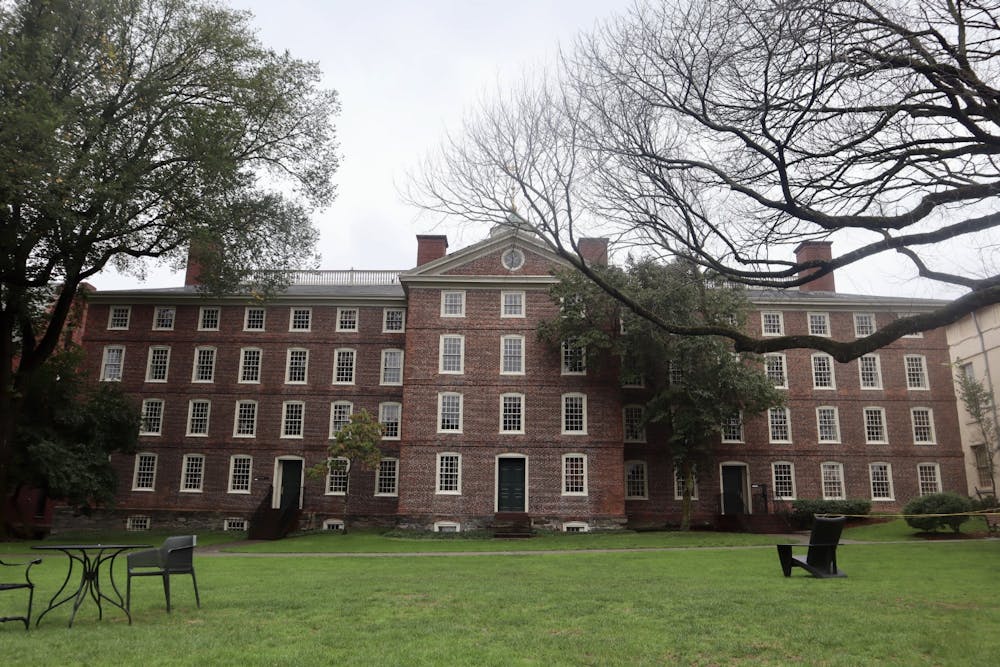Christina Paxson P’19 P’MD’20 announced at Tuesday’s faculty meeting that the University will determine if it needs to “enhance” its Title VI policies. Title VI of the Civil Rights Act of 1964 “prohibits discrimination on the basis of race, color and national origin in programs and activities receiving federal financial assistance,” according to the Department of Justice.
This consideration comes after a letter to schools sent on Nov. 7 from Assistant Secretary for Civil Rights at the Department of Education Catherine Lhamon regarding Title VI and its policies.
“It is your legal obligation under Title VI to address prohibited discrimination against students and others on your campus — including those who are or are perceived to be Jewish, Israeli, Muslim, Arab or Palestinian — in the ways described in this letter,” Lhamon wrote.
Title VI encompasses “unwelcome conduct based on shared ancestry or ethnic characteristics that, based on the totality of circumstances, is subjectively and objectively offensive and is so severe or pervasive that it limits or denies a person’s ability to participate in or benefit from the recipient’s education program or activity,” she added. “Schools must take immediate and effective action to respond to harassment that creates a hostile environment.”
“We have strong policies in place. Harassment and discrimination is against Brown’s code of conduct,” Paxson said at the meeting. “We always look to enhance our policies, and given the Department of Education’s focus, we’re looking at our policies and practices to see if there is a need to enhance or augment any section of them.”
In recent weeks, the Department of Education has opened multiple Title VI shared ancestry investigations over allegations of Islamophobia and antisemitism at higher education institutions, including Harvard, Penn, Columbia and Cornell.
Paxson outlined multiple areas of focus for the University’s Title VI policies, including educating community members about Title VI and “how to address concerns about harassment and discrimination.”
Currently, the Office of Institutional Equity and Diversity website has information on reporting various incidents. Going forward, the University will be developing a new webpage that houses support and reporting resources for Title VI.
Additionally, the University is set to release a new guide on doxxing, cyberbullying and online harassment Wednesday. Doxxing — the act of publicizing personal information, usually in an effort to cause harm — has arisen as a concern on other campuses across the country.
Paxson considered how to address harassment that occurs over anonymous social media and how to support students who experience cyberbullying or doxxing on these platforms. She specifically noted Sidechat, a widely used anonymous social media platform. “I’ve had students share some of what happens on that app,” she said. “It’s not good.”
Additionally, she stated the University will continue to support academic freedom, reaffirming her statement that there is no “Palestine exception” to freedom of expression at November’s faculty meeting. “The difficult part is when speech that would be protected by academic freedom is perceived to be harassing or discriminatory,” she said, noting that the Department of Education’s “Office for Civil Rights is not very clear on how universities need to navigate this.”
“I think one of the lessons that we’re learning is we can develop remedies and responses to concerns that still preserve academic freedom,” she added.
Paxson also addressed tensions on campus and the University’s response after Hisham Awartani ’25 was shot in Vermont on Nov. 25 in what is being investigated as a hate crime. She specifically discussed the vigil held on Nov. 27, in which students shouted her off the microphone as she delivered a speech.
“I thought it would be an opportunity for the community to come together,” Paxson said. “Frankly, I was disappointed that it didn’t have that end and then instead turned into a rally in support of divestment.”
“It is what it is,” she added.
Paxson noted that, since the vigil, she has engaged in “very productive discussions with many people” centered around questions concerning Brown’s values: “How can our students learn nuance and complexity in their analysis of issues? And how do we as educators model and facilitate constructive discourse?”
“It’s important that we take these types of questions and other questions that people have really seriously and make some progress on them,” she added.
Clarification: This story has been updated to better reflect how Paxson described the University's consideration of its Title VI policy.

Ryan Doherty was the managing editor of digital content and vice president of The Herald's 135th editorial board. He is a junior from Carmel, NY who is concentrating in chemistry and economics. He previously served as a university news and science & research editor, covering faculty and higher education.





